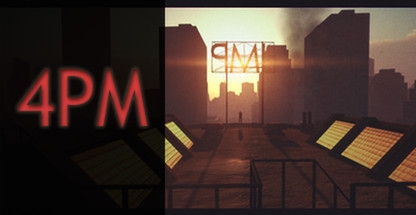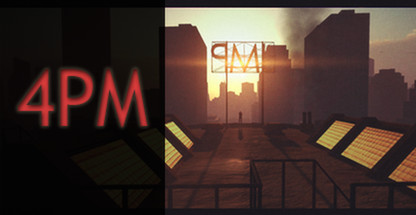Existing User Log In
New User Registration
Register for a free account to gain full access to the VGChartz Network and join our thriving community.





America - Front


America - Back

07th May 2019 | 1,985 views
*NOTE: Given how short the game is, and since I really can’t recommend anyone buying it, SPOILERS for the whole game will be present. Viewer discretion is still advised, I guess.*
It’s really come to this point, hasn’t it? It seems like it was just yesterday when I was jumping into this hip, new scene of walking simulators; new topics were being brought up to discuss and I had fun exploring what did/didn’t fascinate me within this specific sub-genre of games. Each had at least some kind of hook that felt exciting to dive into headfirst to see whether this or that experimental title made some kind of logical leap forward. But stuff like 4PM shows that even newer sub-genres will always have their annoying copycats. While I recognize that this title was ostensibly created by one person (Bojan Brbora)—and I certainly respect having someone even attempt to explore heavy topics like alcohol abuse, but the industry’s also at a place in time when one can’t really pretend to sell themselves with the walking sim novelty on its own.
The story revolves around Caroline, a young woman with an alcohol addiction and a heaping of repressed guilt. That kind of idea certainly sounds like a chance at an interesting examination into this topic; but though the game description desperately tries to convince itself otherwise, there really isn’t any sort of thought-provoking narrative to be found in this dreck. In reality, the story is just as inane as its design. Due to the game’s brevity (roughly twenty-five minutes), the story simply can’t give characters any room to breathe and just sticks to an assortment of tropes that fall like dominoes. The quick and dirty approach into a topic like alcoholism feels poorly thought-out at best or downright disingenuous at worst.

On so many fundamental levels it’s strange to see this supposed interactive drama have no real sense of conviction. Because of there being no HUD or menu options, it’s apparent how minimalistic it’s trying to be in its approach to game design. Even the creator himself talked about trying to keep players more drawn into this world. Despite attempting this, there’s still regular intervals of standard gameplay mechanics used throughout.
One scene has her flashback to a club. After continuously hitting the Q button to dance (knowing to do this thanks to a white-text on-screen prompt) and hearing her say ‘W-w-w-w-w-w-w-w-w-wooooooo!’ for thirty seconds I made my way over to the bar. The bartender refuses to serve her another round but that doesn’t matter because she needs to rush to the bathroom to vomit. An unsubtle, on-screen timer comes up counting down until you’ve triggered a fail. Naturally, the quickest route of reaching the bathroom is blocked off in order for you to do the whole exercise once more to get it right, due to the short timer. Shortly thereafter in present day, there’s a contrived stealth section with Caroline’s objective to sneak past her boss to get a drink at the bar (as if the two bottles she gulped in her work desk weren’t enough to remind you she’s an alcoholic). Sneaking from cubicle to cubicle to avoid a guard’s line of sight has never felt so unappealing. There’s not even any opportunities with this part for one to shape the narrative accordingly; just an instant fail state if caught and redoing the segment, listening to her boss’s looped dialogue over and over.
Even the basics of walking are a test in one's mental fortitude. After a short in medias res beginning, you jump back to her apartment walking from point A to point B with a dotted white line telling you where to go next. The lurching, swaying camera tied with the blurry visuals and low field of view renders the simplest act of walking capable of inducing nausea. While I can’t ignore the notion of artistic intent in subverting norms here and making it feel uncomfortable to play as an alcoholic—giving her debility some context, pushing it to the point of making me feel unwell is just annoying no matter the reasoning.

Now and then there are “choices” presented here, but there’s only one set path until the very end so there’s no impact with them aside from getting a few different lines of bland dialogue. Even one of the most pivotal choices within the game has a right and wrong decision. Should one choose the incorrect one, a cutscene is played for this supposed ending and you’re immediately brought back to the previous checkpoint. For a game about trying to sell itself on decisions that mean something, I can’t think of anything more self-defeating than having a player’s conscious choice be considered a fail state.
Other gameplay extras are such unnecessary fluff that I almost forgot they were in this meager game when first typing this review up. There’s a game within a game portion with Caroline’s computer having a Breakout clone running in the background. And even that harmless addition feels like a poorer copy of what you might just have on a mobile phone. Fortunately, you can complain about it on her nearby laptop that’s just a notepad doc which allows players to type anything.
Even when considering just how mechanically shallow and uncomfortable the whole game is, it also doesn’t even get away with the Dear Esther’s or Proteus’s levels of disabling gameplay because of tossing in traditional mechanics for padding that go against the kind of ‘Iceberg Theory’ foundations. I still have my issues with such a setup in those avant-garde titles but at least what they were going for consistently stayed off the beaten path. Within the first few minutes here: there’s glowing lines guiding you on an already-linear path, obtrusive floating white blocks as indication of the only objects you can interact with in the game, and objective prompts with countdown timers from time to time. It’s essentially the worst of both worlds.
I typically try my best to avoid revealing too much in the way of spoiler-heavy stuff on the off chance the viewer may lose enthusiasm to play the game, but since I’m not recommending it to begin with and the brevity of the experience makes it impossible to vaguely describe just how dumb of a story is here. For ease of breaking down particular events, I feel to the need go point-by-point on this part.
-Another hungover night results in Caroline waking up in her apartment, going to the bathroom, and just going back to listen to the voicemail her boss left on her cell phone. Admittedly, the home phone voicemail messages of both the doctor and mom was actually a nice subtle way of presenting her current emotional condition. It’s a shame that bit of player inference isn’t to be found throughout the rest of the story.
-Has a couple of very short and cryptic flashbacks about driving towards a light.
-Flashback to ‘Press Q to dance’ bar level. Succeeding puke timer segment shows non-interactive cut scene of her meeting some random guy outside of the ladies bathroom and getting his card because that’s totally the suave way to meet women. And what’s with the facetious bathroom sign having the guy symbol peeking over the dividing bathroom wall at the girl symbol?
-Back to present with short taxi ride and up to work. Once she gets to her cubicle, her boss chews her out for being late and calls her a polar bear for being on thin ice. Then comes stealth mission.
-See creepy bathroom guy go upstairs. She follows him (after making the wrong choice). He’s going to jump off the building because he’s getting a divorce and his wife is going to take the children. While taking some time to pick up his materials and consoling him, he turns around and reveals that he been having an affair with her for six months, she was responsible for getting her dad killed in a driving accident that she only remembered glimpses of previously, and oh yeah these couple of tidbits aren’t clearly remembered by her, while vivid details of a bar scene are, because this is how alcohol works now. The logical leaps made in this deus ex machina selective memory are totally comical in its attempts to be some cautionary tale about alcoholism. At least the final binary decision actually results in completely different outcomes; to add a cherry on top, one of them is considered an incorrect one that kicks you back to the previous checkpoint either.
-Queue credits.

In this day and age, it’s easy to notice some people misapplying the term “pretentious” against certain artistic works—granted, I’m certainly not above toying with the term to tease myself. But the word’s intended use is to describe something, the work and/or creative mind behind it, importing an unsubstantiated assumption of having something important or meaningful to say. A lot of creative works can get the label nowadays for nothing more than having the audacity to strive beyond the status quo in some thoughtful way. Some very popular narrative-focused games have received that kind of criticism: Gone Home, Braid, The Stanley Parable, you get the picture. While I haven’t played other popular targets like Bioshock Infinite, the other ones mentioned never really persuaded me into considering them as pretentious because they were just using unconventional methods to effectively tell a story or make some kind of statement through design. When I think of the heavy-handedness that can’t even get a point across in works like this or Lost River (film) more red flags start going up for me. Those works are more suited for that word.
This narrative/gameplay effort wouldn’t be so wholly disastrous either without third-rate audio and visual design—with exception made to voice actors. All character models look wretched, the animations are shoddy, and the sparse environments don’t suggest any kind of aesthetic skill or cohesion. Looking more at the technical side, this seems like the first game I’ve played where any adjustments to technical settings do nothing, perhaps even looks worse at a higher resolution. Much of the audio design and selected soundtrack tunes are quite terrible; however, voice acting at least rises to the level of tolerable for specific characters. It’s during moments like the club level, between the cacophony of various sounds and the terrible visuals, one can’t help but feel the game’s awful technical qualities are conniving with the game’s controls to give the player the worst experience possible; an admirable effort at that.
Even with this considered, some may suggest the sheer level of opprobrium I’m pouring on this project is unfair. After all, when considering that steam’s blurb specifically mentions it being credited as a one-man project (for dev side at least); and since the price seems to have permanently dropped to three dollars from the initial five dollar asking price listed on some critic reviews one should ease off the criticism, right? I find those defenses untenable. It’s the same kind of issue I’m going to take with any purchase: a game's been brought to the marketplace for sale; ipso facto, it should be subject to criticism by anyone on its artistic qualities and/or if it’s worth a consumer’s time and money. And for the record: praised works like Dust: An Elysian Tail, Braid, Thomas Was Alone, Axiom Verge, and more have been one-man jobs too.
If Gone Home or The Stanley Parable are considered the popular watermarks of walking sims as Call of Duty 4 is to first-person military shooters than 4PM is the walking sim equivalent of Rogue Warrior. It wants to consider itself daring when it’s really a by-the-numbers pastiche of Dear Esther, convinced it deserves an award just for participating. And that’s really the crux of my frustration with this ostentatious display: feeling enthralled to see the medium tackling these kinds of tough topics only to feel these themes being terribly-researched and abused by a creator seemingly for the purposes of drumming up public interest. It’s all just a mere façade that left me feeling emptier by the end.
coolbeans’ *Certified RotteN* Badge
coolbeans’ 2014 Bizarro Game of the Year Nominee